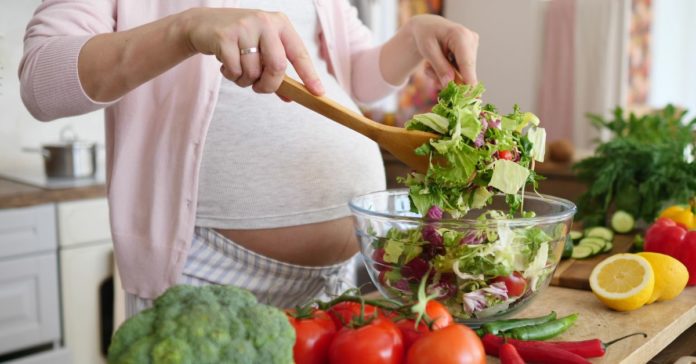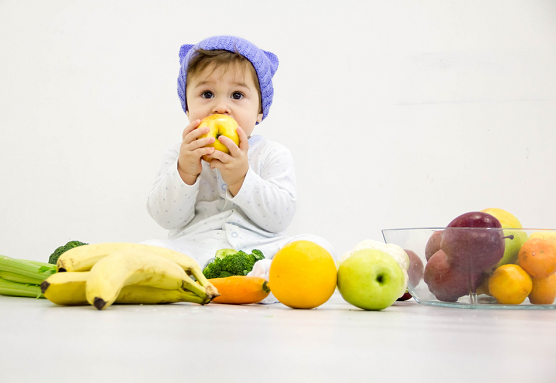Wellness
Vegan and Vegetarian Pregnancy: Ensuring Nutrient Adequacy

Navigating the plant-based path to parenthood requires careful consideration of nutrient adequacy.
Having a well-balanced diet during pregnancy is pivotal for providing essential nutrition to support your baby’s growth. For vegan or vegetarian mums-to-be, the need for mindful nutrient intake becomes more crucial. Clinical dietitians from Mount Alvernia Hospital, Ms Chinnayan Jayanthi and Ms Aileen Ling share the essentials of sustaining a plant-based diet while ensuring optimal nourishment for both mother and child.
The vital nutrients
Expectant mums on a plant-based diet will need to ensure that their diet contains the following essential nutrients.
Protein
The quality of proteins is defined by the amount of essential amino acids they provide. They are most often provided by animal products, because plant-based proteins often lack some of the essential amino acids. Plant-based protein sources such as peas, beans, lentils, chickpeas, seeds, nuts, soy products, and whole grains (e.g. wheat, oats, barley, and brown rice), can however be combined strategically to ensure a complete amino acid profile.
Vitamin B12 and Folic Acid
These vitamins are primarily found in animal products. Although mushrooms, tempeh, miso, and sea vegetables are known to be sources of vitamin B12, their structures do not function in the body the same way. Women on a plant-based diet can take vitamin B12 and folic acid supplements to avoid deficiency and anaemia.
Iron
Although plant-based diets are high in iron from plant foods, this type of iron, known as non-haem iron, is not as well absorbed as iron from meat (haem iron). Combining non-haem iron foods with foods high in vitamin C aids iron absorption.
Zinc
Zinc, crucial for immune system development, can be found in nuts, miso, legumes, wheatgerm, and
wholegrains. However, phytic acid found in whole grains, seeds, beans, and legumes inhibit zinc absorption. This can be minimised by soaking these food and discarding the water, and cooking them.
Calcium
Essential for the formation of healthy bones and teeth, calcium can be gained from calcium-fortified plant-based milk drinks, calcium-fortified cereals and fruit juices, sesame seed paste, tahini, tofu, and dark green leafy vegetables (especially Asian greens).
Omega-3 Fatty Acids
Diets devoid of fish, seafoods, and fortified eggs are deficient in EPA and DHA, crucial omega-3 fatty acids.
Official dietary guidelines recommend 1.1 grams of ALA (alpha linolenic acid) per day for women, but vegans and vegetarians who consume little or no EPA and DHA should get more. One can try flaxseed, walnuts, canola oil, and soy, which are all high in ALA.
Watch out for gestational diabetes
It is found that 1 in 5 pregnancies is complicated by gestational diabetes. For vegan and vegetarian mummies, this poses a great challenge in their meal planning as lentils and legumes, their main protein sources, contain carbohydrates. Seeking guidance from a dietitian is therefore strongly recommended to ensure a diet with the appropriate amounts of carbohydrates. This supports both the mother and baby’s growth and development, while managing the mother’s blood sugar level.
Dietary recommendations
The dietitians serve up a sample meal plan suitable for expectant mothers following a plant-based diet, ensuring that they meet essential nutrient requirements.
| Meals | Suggested Food Choices |
|---|---|
| Breakfast | 1 cup of milk or a high-calcium beverage such as soy, oat or almond milk + 2 slices of wholegrain bread + 1 egg or 2 teaspoons nut spreads |
| Mid-Morning Snack | 1 cup of milk or a high-calcium beverage or 1 serving of fruit (e.g. 1 small apple, 1 wedge pineapple, 10 grapes, or 1 medium banana) |
| Lunch | ¾ to 1 bowl of brown rice, noodles or pasta + 2 small blocks of soft bean curd + 1 to 2 servings of non-starchy leafy vegetables (dark green vegetables preferred, e.g. 4 to 8 tablespoons of cooked spinach) + 1 serving of fruit (optional) |
| Mid-Afternoon Snack | 1 handful of walnuts or 2-3 pieces of wholewheat plain biscuits + 1 cup of plain low-fat or non-fat yoghurt or a high-calcium beverage or 1 serving of fruit |
| Dinner | 1 piece of tortilla or 2 pieces of chappati + 1 small block of bean curd + ¹/³ cup *lentils/pulses + 1 to 2 servings of non-starchy leafy vegetables + 1 serving of fruit (optional) *Note: If there is no concern for gestational diabetes, omit the bean curd, and have ¾ cup lentils/pulses instead as a protein source. |
| Bedtime | 1 cup of milk or a high-calcium beverage |
Role of supplements and fortified foods
Given the absence of certain nutrients in plant-based diets, supplements and fortified foods become essential. In particular, folic acid, vitamin B12, and calcium are often challenging to meet through food alone, hence necessitating supplements or fortified products like calcium-fortified soymilk and iron-fortified breakfast cereal. Do obtain supplements from reputable sources, and consult a healthcare professional when in doubt.
In conclusion, a vegan or vegetarian pregnancy is not only feasible but can be a thriving and healthy journey with meticulous attention to nutrient intake, consultations with dietitians, and strategic dietary choices. The key lies in embracing a variety of plant-based foods, supplementing wisely, and ensuring a well-balanced diet to nurture the well-being of both mother and baby.
Tips for Expectant Mothers on a Plant-Based Diet
- Avoid coffee and tea, as caffeinated beverages impair iron absorption. Switch to herbal or fruit infusion drinks to improve hydration.
- Include healthy snacks in between meals to achieve daily nutrient needs.
- Go under the sunlight for 15 to 30 minutes twice a week to obtain vitamin D which helps with calcium absorption.
Did You Know?
Having a snack in between meals, even when you are not hungry, can help to reduce nausea and vomiting if you are experiencing morning sickness during pregnancy.
Pineapples cause miscarriages. Fact or myth?
Pineapples, and papayas too, contain enzymes that help relax cervix muscles, hence have been related to increased risk of miscarriages. However, these fruits are safe to consume when taken in moderation. To minimise any risk, maintain daily fruit intake to not more than 2 servings.
Our dietitians at Mount Alvernia Hospital provide dietary consultations for both pregnant mothers and growing children. Get in touch with the Nutrition & Dietetics Department at 6347 6702 or email [email protected] for more information!



